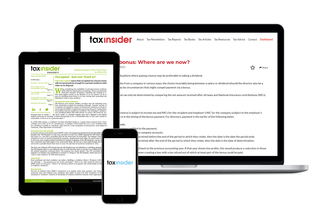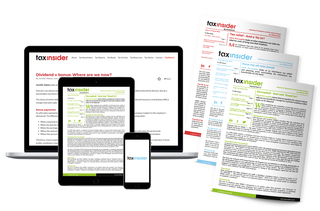New articles published
in February 2026
-
Tax and Romance: Tax-Efficient Planning for Couples
Tax and romance – not exactly the perfect match! However, in this Valentines season, the thoughts of the lovestruck (but fiscally frugal!) may turn to sharing their caring nature in a tax-efficient way.
Mark McLaughlin offers some tips for (tax-conscious!) romantic couples.
-
Interest Income: How It Is Taxed for UK Individuals
Interest income for UK individuals can arise from a variety of sources, including (but not limited to) savings accounts, current accounts, fixed-term deposits, corporate bonds, government gilts, peer-to-peer lending platforms, and some unit trusts.
Richard Curtis looks at how interest income is taxed on UK individuals.
-
VAT on Overseas Goods: Place of Supply and Tax Treatment
The basic rule for considering the place of supply of goods is that they are supplied where they are physically located when they are sold or allocated to the customer.
In the simplest scenario, goods located in the UK at the time they are supplied to a customer are treated as supplied in the UK and subject to UK VAT. If the goods are exported from the UK, they can be zero-rated but the supplier has to fulfil certain criteria in terms of obtaining and retaining export evidence, etc.
Andrew Needham looks at VAT consequences of buying and selling goods that are located overseas.
-
Loans to Participators: An Increase in the Section 455 Charge
There is a corporation tax (CT) charge (CTA 2010, s 455) on loans made to ‘participators’ in close companies that are outstanding at the end of a CT accounting period (CTAP).
This charge used to be at a fixed rate, which Chancellors changed from time to time. However, some years ago George Osbourne altered this principle (in FA 2016, s 50), instead setting the rate at ‘such percentage of the amount of the loan or advance as corresponds to the dividend upper rate specified in section 8(2) of ITA 2007 for the tax year in which the loan or advance is made’.
Kevin Read outlines an upcoming increase in the tax charge under the ‘loans to participators’ provisions for companies.
-
Pensions and Tax Relief: Key Rules and Planning Points
Most people know the importance of saving for retirement. The tax relief on pensions is designed to encourage us to save more.
The government encourages us to save for our retirement; auto-enrolment makes it easy for employees to join pension schemes, and contributions are very tax-efficient. The introduction of lifetime individual savings accounts in 2017 was an additional tool to encourage us to save for the future.Tristan Noyes looks at some key tax rules and important points to remember on pensions.
-
Lending to a Company for Shares: Key Tax Implications
Setting up in business can be expensive, and some entrepreneurs may not have the wherewithal to fund the full cost.
Loans and grants are available from various sources, including banks and the government, but only up to a set amount, which may not be enough to cover start-up costs, day-to-day running of the business for the first few months and personal living costs before the business brings in money. For example, government start up loans allow borrowing between £500 and £25,000 at a fixed interest rate of 6% per year, repayable over one to five years.Jennifer Adams considers important implications of lending money to a company in exchange for shares.
-
Real Property and Tax: Buying, Holding and Selling
Whilst cars, boats and horses are expensive to buy and keep, often those are tax-free upon sale, whereas land and buildings (or ‘real property’) are taxed at every turn.
Chris Thorpe outlines the taxes involved with buying, holding and selling real property.
-
Q&As with Arthur Weller
Some of our most popular articles
-
Dividends or bonuses? We can work it out!
Consider the following scenario:
'On a wintry sunny morning, Alan was reviewing his company’s January 2024 management accounts. Alan was the sole director and 100% shareholder of Llandudno Hotels Ltd, which operated two large hotels in Llandudno. The business was on course to healthy pre-tax profit of around £650,000 for the year ended 31 March 2024. Alan had been planning to pay himself a substantial ‘bonus’ before the year-end'.
What does Alan do?
Peter Rayney examines an owner-manager’s cash extraction following the numerous tax and National Insurance contributions changes.
-
Use them or lose them: 2023/24 tax allowances
As the tax year draws to a close, it is prudent to review one’s 2023/24 tax allowances and consider whether there is scope for utilising any unused allowances so they are not lost.
Sarah Bradford explores options for using 2023/24 tax allowances so they are not wasted.
-
Record-keeping in a digital age
Lee Sharpe looks at taxpayers’ record-keeping obligations in light of HMRC’s inexorable march to digital everything (almost).
Historically, HMRC has been quite relaxed about whether original records must be maintained or digital facsimiles (scans, etc.).
-
Trap for business owners seeking CGT incorporation relief
HM Revenue and Customs (HMRC) recently commenced a ‘One to Many’ campaign, targeting taxpayers who incorporated property businesses in the tax year 2017/18 but reported no capital gains tax (CGT) liability in their tax returns on the basis that ‘incorporation relief’ applied in full.
Mark McLaughlin highlights a potential trap for business owners seeking capital gains tax incorporation relief.
-
Q&As with Arthur Weller
Subscription Benefits
We asked our subscribers what they love about Tax Insider Bundle.
These are the top 7 reasons that they gave us:
Monthly Newsletter
Tax Insider Bundle…





